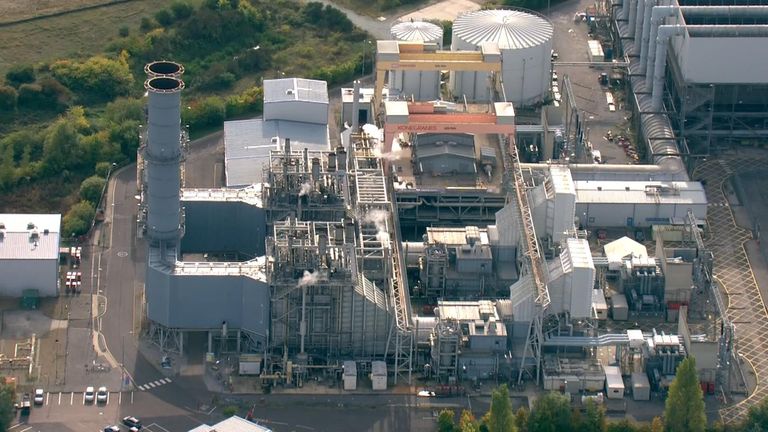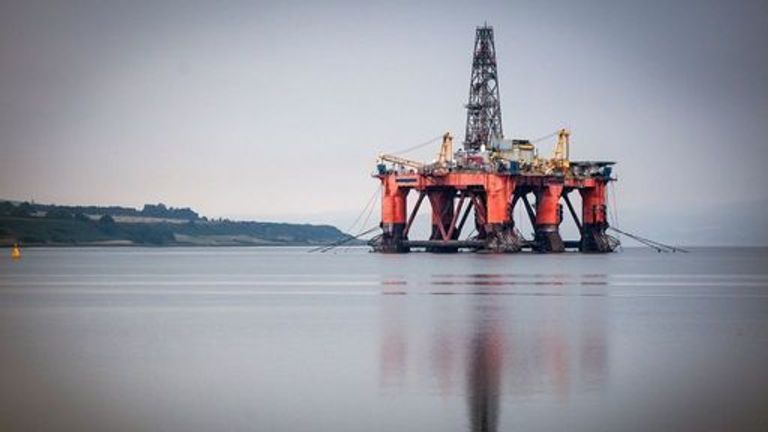Government defies climate warnings by proceeding with new North Sea oil and gas exploration
Jacob Rees-Mogg has insisted a new licensing round for oil and gas exploration will boost the UK’s economy and energy security.
Speaking as the regulator began a new round of offshore licences, the business and energy secretary said Vladimir Putin‘s latest invasion of Ukraine makes it “more important than ever that we make the most of sovereign energy resources, strengthening our energy security now and into the future”.
Producing gas in the UK has a lower carbon footprint than importing from abroad, and will support jobs and boost the economy, he said.
UK economy latest news
Licences are being made available for sectors of the North Sea, known as blocks, with the North Sea Transition Authority (NSTA) estimating over 100 may be granted.
The decision defies warnings from the world’s leading energy organisation, the International Energy Agency, that no new fossil fuel project is compatible with efforts to curb global heating, which is driven primarily by burning fossil fuels.
An analysis of the UK’s untapped North Sea oil and gas fields by US-based Global Energy Monitor warned just yesterday that developing even one of them would run counter to the UK’s climate goals.
The decision to plough on with new licensing has prompted significant backlash from environmentalists.
“Yet again this government’s energy policy benefits fossil fuel companies and no one else,” said Philip Evans, energy transition campaigner for Greenpeace UK.
“Supporting the oil and gas giants profiteering from the energy and climate crises ignores the speedy solutions that are best for the economy, for lowering bills and for the climate,” he added. Mr Evans said energy-efficient homes and renewable power would lower bills and improve energy security faster, while also reducing emissions.
Experts say the new oil and gas would take at least five years to come on stream, but the government says its vital to explore all energy options, amid warnings the UK could face blackouts this winter.
Companies have been urged to apply for licences covering areas to the west of Shetland, in the northern North Sea, the central North Sea, southern North Sea and east Irish Sea.
A total of 898 blocks and part blocks are being made available, but in a bid to encourage production of new oil and gas supplies as quickly as possible the NSTA has identified four “priority cluster areas” in the southern North Sea.
Those areas, located off Norfolk, Lincolnshire and Yorkshire, are known to contain hydrocarbons, which are close to existing infrastructure, giving them the potential to be developed quickly. The NTSA said it will seek to license these areas ahead of others.
Read more:
UK energy firms reassess security of North Sea oil and gas infrastructure after Nord Stream leaks
North Sea oil and gas firms under pressure from govt to invest profits into home-grown energy
‘Security of supply and net zero should not be in conflict’
Dr Samuel said: “The UK is forecast to continue importing natural gas as we transition to a fully renewables system and our North Sea gas has less than half the footprint of imported LNG (Liquified Natural Gas).
“This licensing round includes gas discoveries in the Southern North Sea which can be rapidly tied back to existing infrastructure.”
The NSTA chief stressed all developments undergo environmental and emissions assessments and added: “Security of supply and net zero should not be in conflict.
“The industry has committed to halving upstream emissions by 2030 and investing heavily in electrification, carbon storage and hydrogen.”
On this, he added: “Signs are promising so far – our first carbon storage round closed last month with 26 applications from 19 companies across all the areas we offered.”
Mike Tholen, acting chief executive for industry body Offshore Energies UK (OEUK), said: “The UK gets 75% of its total energy from gas and oil so producing our own reduces our vulnerability to global shortages of the kind caused by the Ukraine conflict.”
Gas and oil are sold on international markets, although much of the gas extracted from British waters is burned in Britain, while oil, which is easier to transport, tends to be exported.
Mr Tholen added: “Our industry is committed to net zero and also to helping build the low-carbon energy systems of the future. But this is a journey that will take decades during which we will still need gas and oil.
“Many existing UK oil and gas fields are in decline so the risk is that production will drop much faster than demand, leaving us more dependent on imports. That is why new licences are so important.”
For all the latest business News Click Here



